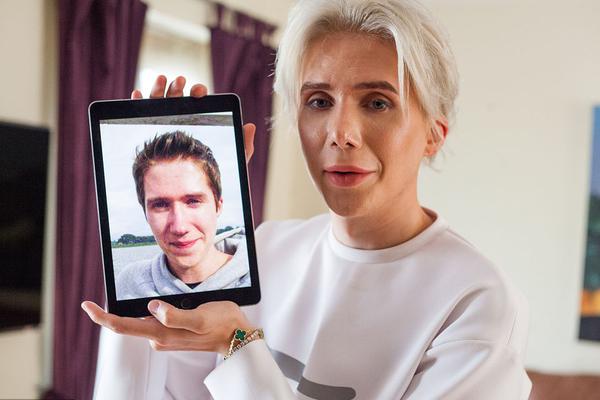You just wanted to see the photos your friend shared. Or buy a pair of shoes. Or read that story.
Now your email account's been hacked,secret sex video your credit card number's been stolen, and your computer for some reason is mining bitcoin.
Welcome to the Internet of Today. The Internet of Tomorrow is shaping up to be a lot worse.
SEE ALSO: Alexa's whispers are the nightmare fuel narrating our crumbling dystopian dreamscapeBut this is not the story of hijacked wireless security cameras crashing the internet, ransomware locking up England's NHS, or a teddy bear that exposes you to hackers. Rather, this is about how securely navigating the internet for simple day-to-day tasks is becoming harder and harder while at the same time our dependency on successfully doing so is only increasing.
If things continue as they are now, soon not even maintaining a healthy paranoia — a prerequisite today for online life — will be enough to keep your data secure. A new approach is called for as we barrel blindly toward our shared dark online destiny.
A look at two common pieces of advice for safely traversing the internet wilds, and how quickly they have become outdated, helps to put things into perspective.
Let's start with something as non-controversial as the old recommendation to use two-factor authentication (2FA). Two-factor authentication safeguards your online accounts with a second layer of protection, and is an absolute must these days. In its most common form, 2FA is a random number texted to your phone when you try to log into an online account. You need that number, plus your password, to get access.
Pretty neat, right? There's just one problem: 2FA in its most common form is now completely busted. There's a known exploit in telephone signaling protocols that lets hackers redirect SMS messages to any phone they want. This is not just theoretical. As previously reported by the International Business Times, a group of hackers recently took advantage of this exploit to hijack 2FA text messages and drain individual bank accounts across Europe.
Ouch.
 For real, though. Credit: getty
For real, though. Credit: getty Sure, there are other forms of 2FA that don't use SMS (and you definitely should use those), but the speed at which an accepted security best practice was turned to trash is astonishing. And it's not the only one.
Virtual private networks (VPN) work by encrypting your online data and running it through their own server before sending it out to the world. This, in theory, is great because it prevents would-be hackers from seeing what you're doing.
Good stuff, right? Well, yeah, except for the fact that a lot of companies offering VPN services are actually all kinds of shady. Basically, if you're not careful, using a VPN might actually make you lesssecure. To make things even crazier, it's incredibly hard to tell which VPN is legit and which is not.
In other words, you might be better off not even trying.
Another blow to online privacy.
Clearly, navigating the internet securely is no easy task — even if you're paying attention. A sophisticated Google Doc phishing scam that hit a slew of journalists in May made it clear that even the professionally skeptical are not immune to a well-crafted attack.
So where does that leave the rest of us? What happens when our online paranoia and fear of every unknown email, link, and update isn't enough to keep us safe? Because that's clearly where we're heading. And anyway, as the old saying goes: Just because you're paranoid doesn't mean they aren't actually out to get you.
As larger portions of our lives migrate online, it becomes correspondingly more important that we are able to protect that space. A new form of digital literacy is called for — one that is less about learning to use Microsoft Excel and more about knowing how to lock down every aspect of our digital selves.
Sound depressing? Maybe, but so is getting your bank account drained by unknown hackers — something the Internet of Tomorrow will be all too happy to assist with.
Topics Cybersecurity
(Editor: {typename type="name"/})
 Trump praises storm response as historic disaster unfolds in Houston
Trump praises storm response as historic disaster unfolds in Houston
 Apple Store goes down ahead of 'California Streaming' event
Apple Store goes down ahead of 'California Streaming' event
 What the Apple vs. Epic ruling means for the rest of Big Tech
What the Apple vs. Epic ruling means for the rest of Big Tech
 Elon Musk started a space library thanks to a tweet and his Tesla
Elon Musk started a space library thanks to a tweet and his Tesla
 Here's how I feel about all this Stephen Hawking 'news' going around
Here's how I feel about all this Stephen Hawking 'news' going around
The Portable Workstation: Dell XPS 13 + 32 UltraSharp 4K Monitor
This teen slept through his alarm because of Netflix and still won gold at the Olympics
 Red Gerard may be an Olympic snowboarder, but he's still a typical 17-year-old at heart.The teenager
...[Details]
Red Gerard may be an Olympic snowboarder, but he's still a typical 17-year-old at heart.The teenager
...[Details]
'LulaRich' tells a baffling story of greed, crime, and crappy leggings
 Every multi-level marketing company promises the same thing: an easy way to make money from home. It
...[Details]
Every multi-level marketing company promises the same thing: an easy way to make money from home. It
...[Details]
Why do brands want your home to smell like meat so badly?
 First there was chicken log. Then there was beef candle. And thenthere was meatball candle.You might
...[Details]
First there was chicken log. Then there was beef candle. And thenthere was meatball candle.You might
...[Details]
Man City vs. Real Madrid 2025 livestream: Watch Champions League for free
 TL;DR:Watch Man City vs. Real Madrid in the Champions League for free with a 30-day trial of Prime V
...[Details]
TL;DR:Watch Man City vs. Real Madrid in the Champions League for free with a 30-day trial of Prime V
...[Details]
Internet nostalgia: Revisiting the meme
 I remember cringing when the video for Weezer's song "Pork and Beans" came out in 2008. Now, I look
...[Details]
I remember cringing when the video for Weezer's song "Pork and Beans" came out in 2008. Now, I look
...[Details]
The Leslie Jones Winter Olympics live
 Every two years, for a few weeks, we all get to enjoy a global phenomenon that brings many countries
...[Details]
Every two years, for a few weeks, we all get to enjoy a global phenomenon that brings many countries
...[Details]
 Zoom says its real-time translation function will be up and running next year for 12 languages.The c
...[Details]
Zoom says its real-time translation function will be up and running next year for 12 languages.The c
...[Details]
Even Trump's Earth Day message was anti
 President Donald Trump just released a statement for Earth Day, and it doesn't seem like he really l
...[Details]
President Donald Trump just released a statement for Earth Day, and it doesn't seem like he really l
...[Details]
Tinder users are changing their locations to match with athletes at the Winter Olympics
 Apparently watching the Winter Olympics on television will no longer suffice in making people feel a
...[Details]
Apparently watching the Winter Olympics on television will no longer suffice in making people feel a
...[Details]
Amazon CEO tries to sell kids on working on the moon

The Netherlands trolls Trump after medals sweep at the Olympics

接受PR>=1、BR>=1,流量相当,内容相关类链接。